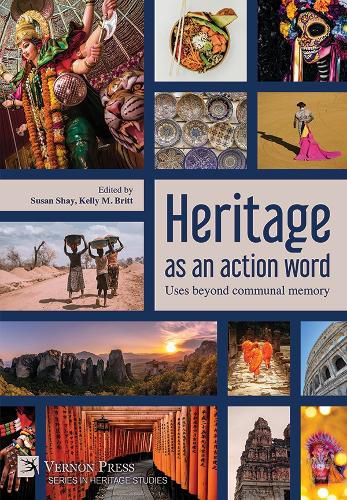Readings Newsletter
Become a Readings Member to make your shopping experience even easier.
Sign in or sign up for free!
You’re not far away from qualifying for FREE standard shipping within Australia
You’ve qualified for FREE standard shipping within Australia
The cart is loading…






This title is printed to order. This book may have been self-published. If so, we cannot guarantee the quality of the content. In the main most books will have gone through the editing process however some may not. We therefore suggest that you be aware of this before ordering this book. If in doubt check either the author or publisher’s details as we are unable to accept any returns unless they are faulty. Please contact us if you have any questions.
There is no limit to what constitutes heritage. By definition, heritage is the use of the past for present purposes. Yet, to any given group or population, heritage can be a multitude of things and can serve a variety of purposes. Based on shared memory, heritage can be tangible or intangible, boundless in variety and scope: it can be, for example, objects, landscapes, food or clothing, music or dance, sites or statues, monuments or buildings. Importantly, however, heritage also has many and varied uses and powers. It can be used to control, to unite, to engage, and to empower people, communities, and nations. ??
In this interdisciplinary volume, authors from around the world explore how different communities, nations, and groups intentionally and creatively use heritage, both tangible and intangible, in a wide variety of ways to positively address social and environmental issues. Significantly, these studies demonstrate how heritage can be an exceptionally valuable tool for political, economic, and social change. Insightful studies are presented pertaining to heritage as social memory, including the nationalistic political use of heritage, heritage as resistance to political powers, traditional knowledge as environmental science, heritage for legal and community action, heritage for building peace, heritage for Indigenous and minority empowerment, and heritage for exploring the past through phenomenological methods. The goal of this volume is to move beyond seeing heritage as only social memory, a mere interpretation of static past events, people or places, and instead explores critically the variety of ways heritage is engaged in the present and can be in the future.
$9.00 standard shipping within Australia
FREE standard shipping within Australia for orders over $100.00
Express & International shipping calculated at checkout
This title is printed to order. This book may have been self-published. If so, we cannot guarantee the quality of the content. In the main most books will have gone through the editing process however some may not. We therefore suggest that you be aware of this before ordering this book. If in doubt check either the author or publisher’s details as we are unable to accept any returns unless they are faulty. Please contact us if you have any questions.
There is no limit to what constitutes heritage. By definition, heritage is the use of the past for present purposes. Yet, to any given group or population, heritage can be a multitude of things and can serve a variety of purposes. Based on shared memory, heritage can be tangible or intangible, boundless in variety and scope: it can be, for example, objects, landscapes, food or clothing, music or dance, sites or statues, monuments or buildings. Importantly, however, heritage also has many and varied uses and powers. It can be used to control, to unite, to engage, and to empower people, communities, and nations. ??
In this interdisciplinary volume, authors from around the world explore how different communities, nations, and groups intentionally and creatively use heritage, both tangible and intangible, in a wide variety of ways to positively address social and environmental issues. Significantly, these studies demonstrate how heritage can be an exceptionally valuable tool for political, economic, and social change. Insightful studies are presented pertaining to heritage as social memory, including the nationalistic political use of heritage, heritage as resistance to political powers, traditional knowledge as environmental science, heritage for legal and community action, heritage for building peace, heritage for Indigenous and minority empowerment, and heritage for exploring the past through phenomenological methods. The goal of this volume is to move beyond seeing heritage as only social memory, a mere interpretation of static past events, people or places, and instead explores critically the variety of ways heritage is engaged in the present and can be in the future.